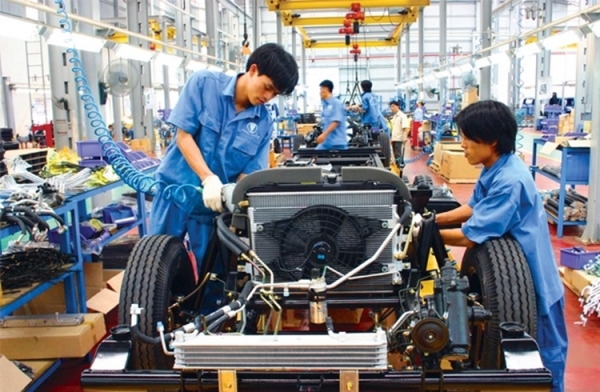Still need to import semiconductors
According to the statistics of the Ministry of Industry and Trade, the automotive industry is still importing 80% of its manufacturing components. However, with the current trend of rapid motorization and the forecasted continuous increase in the future, it will be a “bright spot” to contribute to the strong activities of the supporting industry.

The automotive industry is one of the industries that need to increase localization through the supporting industry
The Industrial Department (Ministry of Industry and Trade) also pointed out that currently, the number of supporting industrial enterprises in the automotive industry in Vietnam is quite low, with only about 300 companies from all economic sectors. Among them, there are more than 40 companies involved in car production and assembly; 45 companies producing frames, car bodies, and cargo vehicles; 214 companies producing components and spare parts for automobiles…
In reality, Vietnamese companies only produce and process less than 300 parts, while a car contains about 30,000 components. In addition, the technological content and value of these components and spare parts are not high, as they are only cumbersome components that require a lot of labor such as seats, wiring harnesses, wheel rims, door trims, tubeless tires… and some companies invest in body stamping and vehicle shell lines. The important components such as engines, transmission systems, gearboxes, safety systems, and electronic systems in cars, especially semiconductors, are not yet produced domestically and still rely heavily on imports.
Not only that, the automotive manufacturing sector also relies heavily on various types of semiconductors. On average, a car has hundreds of semiconductor components, which translates to about 1,400 types of chips in a car. However, there is currently no local company that can produce a complete chip, and all chips have to be imported from abroad.
The Ministry of Industry and Trade stated that there are many reasons why the domestic automotive supporting industry has not developed as expected, such as insufficient strong mechanisms and policies, scattered and lack of concentration; limitations in terms of human resources and competitiveness of businesses. Nevertheless, in recent times, domestic industrial support enterprises have gradually improved their qualifications and produced high-tech products with high precision, contributing to value-added enhancement.
Need to establish a domestic manufacturing and component supply chain
With the projected demand for automobiles in Vietnam in 2025 at an average of about 800 – 900 thousand units and in 2030, about 1.5 – 1.8 million units, if the domestic automobile production and assembly industry is not developed, the entire passenger car market will be imported; passenger cars and commercial vehicles will be imported 50%, and 50% will be produced domestically with a localization rate of 50%, then the estimated import turnover in 2025 will be about USD 12 billion, and in 2030 it will be USD 21 billion. According to assessments, if there are no early solutions and policies to support the automotive production, assembly industry and the mechanical and automotive supporting industry, Vietnam will become a car consumption market for FDI companies in Vietnam.
To achieve this, businesses need to collaborate and support each other to build a nationwide manufacturing and product supply network and expand exports.
Mr. Pham Tuan Anh, Deputy Director of the Industrial Department, said that the Ministry of Industry and Trade has implemented many management and development solutions for industrial clusters in accordance with Decree No. 68/2017/ND-CP of the Government, emphasizing the role of business promotion activities in connecting domestic and international enterprises. The potential of the automotive supporting industry in Vietnam has been recognized by international friends. “The support policies of the Government are increasingly closer to businesses. That is why some major car manufacturers in the world have recently tended to shift from importing completely built-up cars to assembling cars in Vietnam” – Mr. Pham Tuan Anh stated.
According to representatives of the Industrial Department, the active participation of leading companies like Thaco and Vinfast plays an important role in promoting the development of the automotive supporting industry. This is an opportunity for second-tier component suppliers to exchange, research, and improve skills and product quality.
In addition to the support of leading companies, the automotive industry also needs strong policies to address issues such as large investment costs while having small production capacity and no high-quality material industry… in order to quickly narrow the cost gap, expand the domestic component network, and promote the development of the supporting industry in the future.
Vietnam is a transitioning economy, so it is necessary to adjust, change, and supplement policies to make them more suitable. The development of the automotive supporting industry will be a driving force, promoting other industries such as metallurgy, plastics, rubber, chemicals, textiles, electronics… contributing to job creation, adding value to the economy, and stimulating domestic consumption.





![[Photo Essay]: Experts, Managers, and Businesses Unite to Forge a Path Towards Sustainable Green Industry](https://xe.today/wp-content/uploads/2025/07/z678592918-150x150.jpg)


![[Photo Essay]: Experts, Managers, and Businesses Unite to Forge a Path Towards Sustainable Green Industry](https://xe.today/wp-content/uploads/2025/07/z678592918-100x70.jpg)



